Abstract
Objectives
Current study was conducted between September 2014 and January 2015 in Gaziantep proviency Şehitkamil town Şirinevler district. Purpose of the study is to measure changes experienced, point of view on menopause, and life style of women who are older than 40, living in said district, and within post-menopause and how these factors effected their feelings of guilt and shame.
Methods
Out of universe consisting of 800 women, 500 participants have joined the study. Data collected by personal information form, Guilt-Shame scales, and World Health Organization quality of life (WHOQOL-BREF) scales. SPSS 18 was used to conduct statistical analysis.
Results
Analysis indicated that 78.6% of the participants was not literate, 37.8% of the participants were was subjected to domestic violence. Fifty-five percent of the participants were found to see menopause as a predicament, 45.4% as a disease, and 56% as infertility. Results of scales are as follows; guilt factor 48.95 ± 0.37, shame factor 44.89 ± 0.27, body 10.64 ± 0.42, mental 10.96 ± 0.39, social 11.12 ± 0.49, environment 10.84 ± 0.37.
Conclusions
No significant correlation found between Guilt: body, mental, social, and environmental area (P < 0.05). It was found that there is a significant correlation between the thought that menopause is not a bad thing and the perceived guilt (P < 0.001). Results of analyses indicate that information about menopause significantly correlates between perceived guilt (P < 0.05). Current study found that as perceived shame and guild increases, the life quality of the sample decreases and the average life quality of the sample is below average.
Women's health bears priority in health care services because of its directly associated with family and public health.1 Nowadays, life standards has increased with the rise in life expectancy. According to 2015 data of Turkish statistical institute (TUIK), expected life expectancy of women is 80.7 years. In parallel with increasing average life expectancy the elderly population increases and it is extending the time spend in the postmenopausal period. According to the World Health Organization (WHO) the definition of menopause is the ending of mensuration permanently as a result of ovarian activity cessation.2 In order to understand menopause life we need to consider psychological, cultural and social factors as well as biological factors.34 Traditions, ethnic structure of the society, the value given to the elderly and women, the role of women, women's sexuality, women's life philosophy and meanings ascribed to the menopause by the society and the women has a significant effect on the comprehension of menopause, menopausal complaints and menopausal behavior.56 It is mentioned that marriage and relation with one's spouse plays an important role with women coping with menopausal complaints.789 Varma et al.10 had reported that thoughts are emerging like agedness and uselessness in the menopausal women. Yang et al.11 found that the psychological and somatic symptoms are more widespread than vasomotor symptoms in China. Alpay et al.12 have been detected 65.5% of women have minor anxiety and 23% of women have major anxiety. It is stated that in the menopause the mood state is 73.5%, the physical and emotional exhaustion is 71.3% and irritability is 68%.13 Depressive disorders that experienced during menopause is a major public health problem.14
Feelings of guilt and embarrassment are feelings which helps manage oneself and they are two emotions that motivates one to meet certain standards and regulates social behavior. If the experiences of these feelings are too low or intense it can affect the psychology of individuals in a negative way as they can lead to problems in development and socialization.15 The concept of guilt and embarrassment are varies from culture to culture as it is advocated by some researchers.16 It is supposed that people have feelings of guilt and embarrassment in the menopause. It is suggested that these feelings are guiding our behavior and affecting the image of ourselves in the eyes of others. Both feelings are enhanced by interpersonal and family relationships, and it is believed that they are based on feelings of moral self-awareness.1517 If these feelings are experienced with the appropriate functional density, it can assist in the socialization of individuals, the formation of personal development and the social adaptation to life in a healthy way. Inappropriate experiencing of these emotions is negatively effects the psychology of the individual and can cause a number of problems in development and socialization.15 This study conducted to determine the changes that women experience during menopause and the effect of creating guilt and embarrassment in women and its impact on quality of life (QOL).
This study had been done as a descriptive research in between September 2014 and January 2015 in a town of Gaziantep, Şehitkamil in Şirinevler district with 500 women who agreed to participate among the 800 women aged above 40 years. Women's residences determined by the information taken from the family health centers, all residences are visited and the universe tried to be determined by without sampling with face-to-face interviews. The data was collected by socio-demographic oriented personal information form for menopausal women, guilt-embarrassment, WHOQOL-BREF scales that prepared by the researcher. Accordance to the results of first data collected from the pilot interviews, deficiencies of the first personal information form was corrected. People who received preliminary study are excluded from the assessment. WHOQOL-BREF scales consists of 26 items from the original Turkish version consists of 27 items. Answers to these questions are 5 choices. The QOL total score of minimum 4, maximum 20. Seven scale physical, mental 6, social 3, article 8 contains the environment. Scale contains substances consisting of two general QOL and overall health matter. Field points, it is obtained by multiplying the average of the four items forming field. Increasing scores indicate good. There are 41 question which first 4 question is to determine demographic profile of the women such as age, education level, marital status, number of children, education and occupations of the spouses, in the questions between 8 and 41 is to determine spouses point of view to the women, difficulties facing in menopause, perception of menopause, receiving information and treatment about menopause and its impact on sexual life. The data collected is assessed by SPSS 18 statistical analysis program (SPSS Inc., Chicago, IL, USA) with independent samples t-test, one-way analysis of variance (ANOVA) tests.
Participants in the study; 46.6% are 49 to 54 years old, 78.6% have no literacy, all housewife, and 49.2% witnessed their last menstruation in 45 to 49.
In the Table 1, women stated that they been in menopause, 60.4% of women for 1 to 5 years, 32.8% of women for 6 to 10 years. Ninety-five point four percent of women stated they had difficulties in menopause, 87.8% of it is psychological and physical, 6.6% had psychological only and 1% had physical only distress. Thirty-two point two percent of women stated they had hot flashes, 23.6% had hot flashes and night sweat, and 14.6% had hot flashes, night sweats and palpitations together. Women experienced psychological symptoms as 42.6% with tension, 15.2% with insomnia, and 7.2% wi th both tension and bad temper.
In the Table 2, 55% of women stated menopause is a bad situation for women, 45.4% stated menopause is a disease, 56% of women stated it is being infertile. Seventy-nine point six percent of the women stated its not depended on the individual, 41.4% stated they felt nothing when they enter menopause, 10% stated they had depressed feelings such as sorrow, over-sensitiveness and unwillingness, 26.6% experienced sorrow, 13% experienced anxiety, 10.2% experienced both sorrow and anxiety. Women stated that their first mentioned person about their menopause 53.6% to their spouse, 24.2% to their neighbor, 12.8% to their sibling, and 6% to their children.
In the Table 3, 74.4% of women stated they had received the information about menopause, 16.6% received from their neighbor, 14.6% received from both neighbor and relative, 13% from relative and medical personnel, 9.8% from a relative, 9% from a medical personnel. Seventy-nine point four percent of women stated they did not received menopause treatment; who received treatment 10.6% had drug therapy, 10% had alternative therapies. Ninety-four percent of women stated they did not received depression medication, 76.2% did not seek medical aid, who seek medical aid experienced 6% delayed menstruation, 5.2% hot flushes, 2.2% palpitations, 2.2% insomnia, 2% perspirations.
In the Table 4, 29.6% women stated the menopause affected their sexual life, 46% of women stated their spouse is sexually less satisfied and 9% stated that their spouse not satisfied. Eighty-two point eight percent of women is proud of their ability to childbearing, 73.2% of women said ‘you should not bear a child as long as the spouse wants’, 92.8% of women says it is not fair for spouse to marry another woman just for having a child.
In the Table 5, 54% of women stated they are partially participating the familial decisions, 22.6% of women stated they experienced spousal abuse, 87.8% of women stated there are no changes on their importance and prestige in the family during menopause, 10% stated it is decreased and 2.2% stated it is increased. Eighty-five point six percent of women stated that their spouse did not influenced by the menopause, 81.2% stated their spouses' interest and desire did not decreased, 79% stated that their spouses love did not decreased during menopause. Sixty-nine point two percent women stated that their husbands said nothing when they told them about the menopause.
In the Table 6, thinking menopause as a bad situation significantly affects the guilt emotion (P < 0.001). Having the information significantly affects perceived guilt (P < 0.05). Significant relationship is identified between questions, decrease in love between spouses after menopause, maintaining ability to childbearing pride, women should bear child as long as spouse wants, will spouse justified if he marry another women just to bear a child and the thoughts about early/late menopause starting ages individual woman dependence (P < 0.05).
In the Table 7, it is found that the perceived emotion guilt is significantly affected by the thoughts about reduced sexual life in the menopause (P < 0.05). After the results of tests carried out by independent sample t-test using Bonferroni correction (α/3 = 0.017) between subgroups, ‘Yes’ group has been found to show lower perceived guilt than the ‘partially’ group (P < 0.017). The thoughts of making spouse sexually satisfied after menopause is significantly affects perceived guilt (P < 0.001). After the results of tests carried out by independent samples t using Bonferroni correction (α/4 = 0.00025) between subgroups, the ‘blank’ group has been found to show higher perceived guilt than the ‘very’ group and the ‘low’ group (P < 0.00025; P < 0.00025 respectively). The ‘dissatisfied’ group has been shown higher perceived guilt than both of the ‘quite’ group and the ‘low’ group (P < 0.0125; P < 0.00025 respectively). It was determined that the group says ‘menopause is being infertile women’ has showed higher perceived guilt than says ‘no’ to the question (P < 0.05). Variance analysis was carried out between ‘women should bear child as long as spouse wants’ question and guilt factor, it is observed that women developed higher perceived guilt in the ‘yes’ group than the ‘no’ group (P < 0.05).
In our study, women stated that they had been in menopause, 60.4% of women for 1 to 5 years, and 32.8% of women for 6 to 10 years. Kavlak18 stated 64.1% of women for 1 to 3 years, Ertem4 stated 48% of women for 1 to 5 years, Tunç19 stated 49.2% of women for 1 to 4 years been in menopause. Our study is consistent with Kavlak, Ertem, and Tunç's studies.
In our study, 55% of women stated menopause is a bad situation for women, 45.4% stated menopause is a disease, 56% of women stated it is being infertile. Tunç19 reported 26.4% of women stated that menopause is a disease, 89.4% of women stated the menopause is a loss of ability to bear a child. Kapdağli20 reported 70.2% of women stated that they feel bad during menopause. Seventy-nine point six percent of women stated early/late starting age of the menopause does no depending on the woman, 41.4% of women stated they felt nothing when they enter the menopause, 10% of women stated they experienced depressive emotions as sadness, sorrow, unwillingness, over-sensitiveness, 26.6% experienced sorrow, 13% experienced anxiety, 10.2% experienced sorrow and anxiety.
Ninety-five point four percent of women stated they had experienced distress while menopause, 87.8% of it both physical and psychological distress, 6.6% of it is only psychological distress while 1% of it is physical distress only. Thirty-two point two percent of women experienced hot flashes, 2.6% of women experienced both hot flashes and night sweating, 14.6% of women experienced hot flashes, night sweating and palpitations. The psychological experiences of women's are, 42.6% tension, 15.2% insomnia, 7.2% tension and bad temper. In Alpay et al.'s study12, it is found that 87.8% of women experienced physical and psychological distress. Karlidere and Özşahİn21 has found that first place in the frequency of symptoms of menopause are psychological and vasomotor symptoms. Ertem4 has found that 85% of women experienced difficulties related to the menopausal period, there difficulties are 60% physical, 40% physical and psychological difficulties. Our study is consisted with Karlidere and Özşahİn's study21 and Ertem study4. In Karlidere and Özşahin's study21, the most commonly identified menopause symptoms are; 97.7% unrest and distress, 94.7% fatigue, hot flushes and fainting, 93.3% cold sweating, 92.8% soreness in the leg and arm joints, 91.9% amnesia. In the Fakil's study22; subjects experienced during the menopause, 63% hot flashes, 49% nervousness, 42% palpitations, 44% insomnia, 50% fatigue, 57% night sweats is determined. In Kiroğlu's study23, women stated 55% had hot flushes frequently, 42.5% had insomnia occasionally, 47.5% had dizziness occasionally, 47.5% had palpitations occasionally, 50% had headaches occasionally. Researches has determined that the most visible symptom is hot flashes. Our research has less resemblance with Karlidere and Özşahin's study21, but has more close resemblance with Fakili's study22 and Kiroğlu's study23. It can be connected to the research done in similar socio-economic environment.
Seventy-nine point six percent of women stated they felt free to tell their spouse about they are in menopause, women's first person they told about menopause 53.6% their spouse, 24.2% their neighbor, 12.8% their sibling, 6% their children. Kiroğlu23 found that women prefer to tell about entering menopause to 30% to spouse, 30% to parent/sibling/child, 10% to physician, 10% to another person, 7.5% to a friend, 2.5% to their daughter and 10% prefer to tell no one. Women who described the menopause as a lost 32.5% of them stated ‘quite loss’ and 47.5% often experienced nervousness and unrest, 35% often experienced bad feelings. In Koç and Sağlam's study24, 57% of women think that it is bad and 37.2% of women thinks that they are no longer a woman. In the Sis's study25, women perceived the menopausal period as, 60.8% getting old, 19.4% decreasing of/ end of sexuality, 41.8% end of fertility, 26.2% loss of feminine features, 35% natural and normal process, 62.4% shared their menopausal distress with their spouse, 50.6% with their friend/neighbor, 35.7% with their children, 17.5% shared with no one. It can be mentioned that our study has similar findings on women's menopause perceiving with Sis's study25, Tunç's study19, Kapdağli's study20, Koç and Sağlam's study24. The end of the fertility can be perceived as the end of womanhood in the societies that women's socio-economical existence associated with the ability of childbearing. Probably, it is about socio-cultural and psychological factors plays a role on development of this idea (Table 2).
In the study, women's stated; 29.6% their sexual life is affected, 46% their spouse is sexually dissatisfied, 82.8% proud of their ability to child bearing, 73.2% of women says ‘you should not bear a child as long as the spouse wants’. Ninety-two point eight percent of women said it is unfair for their spouse to marry with another women for a child. Shame number of children were significantly statistically significant relationship between the social and environmental areas (P < 0.05). Varma et al.10 stated that 69% of women expressed menopause does not affecting their sexual life. According to Kiroğlu23, in menopause 37% of women experienced frequently decreased, 25% of women experienced occasionally decreased sexual desire. Balik26 stated that almost half of the menopause women experienced severe sexual problems while 29.1% experienced moderate sexual problems during menopause. Menopausal women stated that about 35.5% women occasionally, 22.7% women frequently dissent from sexual intercourse with their spouses. Our study shows similarities with Balik and Kiroğlu's studies while it does not with Varma can be connected to different-similar culture research universe. In Shobeiri et al.'s study27, women with more than three children obtained higher scores of QOL compared to those who had fewer than four children, this difference was significant in psychosocial domain. This is similar to the our study (Table 4).
Women in our study stated; 54% of them participating familial decisions, 22.6% experiencing spousal abuse, 87.8% of women stated there are no changes on their importance and prestige among the family during menopause, 10% stated it is decreased and 2.2% stated it is increased. Eighty-one point two percent stated their spouses' interest and desire did not decreased, 79% stated that their spouses love did not decreased during menopause. Sixty-nine point two percent women stated that their husbands said nothing when they told them about the menopause. Şahin28 detected women who experienced physical abuse at least once from their spouse 35% in whole Turkey and 40% in Eastern Anatolia region. Ertem4 detected 10% women's family relations are affected by menopause, Koç and Sağlam24 detected 80% of women participating familial decisions, 9.8% of women partially participating familial decisions. According to the findings the high number of women participating familial decisions is a satisfactory and positive finding. Tot29 survey states that in societies and families that gives women rights to speak and respectability, it is easy for women to adapt the menopause smoothly (Table 5).
In our study, thinking menopause as a bad situation significantly affects the guilt emotion (P < 0.001). Having the information significantly affects perceived guilt (P < 0.05). Significant relationship is identified between questions, decrease in love between spouses after menopause, maintaining ability to childbearing pride, women should bear child as long as spouse wants, will spouse justified if he marry another women just to bear a child and the thoughts about early/late menopause starting ages individual woman dependence (P < 0.05). Tortumoğlu6 found that among the reasons for Turkish women to perceive menopause as a bad thing are loss of motherhood, loss of femininity and marital relationship, changes in the posture, loss of physical and sexual power can be counted. As in many cultures, Turkish culture is conceives the menopause as the loss of fertility. Cirhinoğlu and Güvenç30 states, because of maintaining social harmony, loving others and getting connected with them also makes women vulnerable to risk of losing the love of others and increase the dependencies on what others thinking, emerges as a factor that enhances shame and guilt tendencies (Table 6).
Thinking menopause as a bad situation significantly affects the guilt emotion (P < 0.001). Having the information significantly affects perceived guilt (P < 0.05). It is found that as women's level of shame and guilt increases their life qualities are decreasing and women guilt-shame and QOL is above average level.
In order to increase the quality of women's life during menopause which causes significant changes, women should be told that it is not a disease but an inevitable experience and misunderstandings that negatively affecting QOL should be explained. Medical staff should play a more constructive role in reducing emotional and physical symptoms. Not only women but all society should be informed about menopause and its effects on women's life and the mass media should be mindful to this issue. The education and consulting services of the medical staff has an important place for women to spend healthy menopausal period, to cope with the problems experienced during this period and the ability to improve their QOL.
Figures and Tables
References
1. Sis Çelik A, Pasinlioğlu T. Women's menopausal sypmtoms and factors affecting it during climacteric period. Hacettepe Üniv Hemşirelik Fakültesi Derg. 2014; 1:16–29.
2. Özcan H, Oskay Ü. Evidence based symptoms management in menopause. Göztepe Tip Derg. 2013; 28:157–163.
3. Bayraktar R, Uçanok Z. Menopoza ilişkin yaklaşimlarin ve kültürlerarasi çalişmalarin gözden geçirilmesi. Aile Toplum. 2002; 5:5–12.
4. Ertem G. To determine the life quality of women in climacterium period. Uluslararasi İnsan Bilimleri Derg. 2010; 7:469–483.
5. Tokuç B, Kaplan PB, Balık GÖ, Gül H. Trakya Üniversitesi hastanesi menopoz polikliniğine başvuran kadinlarda yaşam kalitesi. J Turk Soc Obstet Gynecol. 2006; 3:281–287.
6. Tortumluoğlu G. Menopause in Asian and Turkish women. Uluslararasi İnsan Bilimleri Derg. 2004; 1:1–10.
7. Aaron R, Muliyil J, Abraham S. Medico-social dimensions of menopause: a cross-sectional study from rural south India. Natl Med J India. 2002; 15:14–17.
8. Çoban A, Nehİr S, Demirci H, İnceboz Ü. The impact on menopausal symptoms of marital adjustment and attitude toward menopausal of married women in the climacteric period. F.Ü. Sağ Bil Derg. 2008; 22:343–349.
9. García-Portilla MP. Depression and perimenopause: a review. Actas Esp Psiquiatr. 2009; 37:213–221.
10. Varma GS, Oğuzhanoğlu NK, Karadağ F, Özdel O, Amuk T. The relationship between depression and anxiety levels and sexual satisfaction for natural and surgical menopause. Klin Psikiyatri Derg. 2005; 8:109–115.
11. Yang D, Haines CJ, Pan P, Zhang Q, Sun Y, Hong S, et al. Menopausal symptoms in mid-life women in southern China. Climacteric. 2008; 11:329–336.
12. Alpay N, Kİvanç ZE, Ulaşoğlu C. The relationship between hormonal profile and depressive symptoms in menopausal women. Düşünen Adam J Psychiatr Neurol Sci. 2013; 26:171–176.
13. Chedraui P, Pérez-López FR, Mendoza M, Morales B, Martinez MA, Salinas AM, et al. Severe menopausal symptoms in middle-aged women are associated to female and male factors. Arch Gynecol Obstet. 2010; 281:879–885.
14. Llaneza P, García-Portilla MP, Llaneza-Suárez D, Armott B, Pérez-López FR. Depressive disorders and the menopause transition. Maturitas. 2012; 71:120–130.
15. Özer M. The relations between guilt-shame, attachment, perceived parenting (mother) style and psychological symptoms [master's thesis]. Ankara, TR: Kara Harp Okulu;2011.
16. Karataş Z. Lise öğrencilerinin suçluluk ve utanç puanlarinin disiplin cezasi alip almama ve cinsiyetleri açisindan dncelenmesi. Mersin Üniv Eğitim Fakültesi Derg. 2008; 4:103–114.
17. Tangney JP, Dearing RL. Shame and guilt. New York, NY: Guilford Press;2003.
18. Kavlak T. Menopoz dönemindeki kadınlarda kaygı düzeyleri ve cinsel doyumun saptanmasi [master's thesis]. Ankara, TR: Gazi Üniversitesi;2011.
19. Tunç N. Menopoz dönemindeki kadinlarin menopoz dönemi ile ilgili bilgi, yakinma ve baş etme durumlarinin belirlenmesi [master's thesis]. Sivas, TR: Cumhuriyet University;2014.
20. Kapdağli D. Postmenopozal kadinlarda cinsel yaşam kalitesinin değerlendirilmesi [dissertation]. Adana, TR: Çukurova Üniversitesi;2009.
21. Karlidere T, Özşahİn A. The relationship of menopausal symptomatology with anxiety and depression levels and social supports. Klin Psikiyatr Derg. 2008; 11:159–166.
22. Fakil FE. Menopoza girmiş kadinlarin beslenme durumlari ile fiziksel aktivite ve beslenme bilgi düzeylerinin belirlenmesi [master's thesis]. Ankara, TR: Başkent Üniversitesi;2013.
23. Kiroğlu FG. Menopoz döneminin kadinin sosyal ilişkilerine etkisi [master's thesis]. Ankara, TR: Ankara Üniversitesi;2005.
24. Koç Z, Sağlam Z. The determination of the symptom and the attitudes of women in climacterium period related to menopause. Aile Toplum. 2008; 10:100–112.
25. Sis A. Menopoz dönemindeki kadinlarin menopozal yakinmalarinin evlilik uyumuna etkisinin belirlenmesi [master's thesis]. Erzurum, TR: Atatürk Üniversitesi;2010.
26. Balik D. Menopoz evlilik ilişkileri üzerindeki etkisinin incelenmesi [master's thesis]. Ankara, TR: Ankara Üniversitesi;2013.
27. Shobeiri F, Jenabi E, Hazavehei SM, Roshanaei G. Quality of life in postmenopausal women in Iran: a population-based study. J Menopausal Med. 2016; 22:31–38.
28. Şahin D. Cezaevindeki şiddet failleri ve siğinma evinde kalan şiddet mağdurlarinin şiddete bakiş açilari ile suçluluk utanç duygularinin değerlendirilmesi [dissertation]. Istanbul, TR: İstanbul Üniversites;2013.
29. Tot Ş. Psychiatric aspects of menopause. Anadolu Psikiyatr Derg. 2004; 5:114–119.
30. Cirhinlioğlu FG, Güvenç G. Shame proneness, guilt proneness and psychopathology. UluslararasÕønsan Bilimleri Derg. 2011; 8:248–267.




 PDF
PDF ePub
ePub Citation
Citation Print
Print


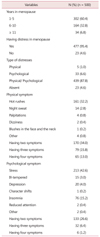
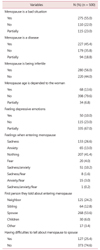
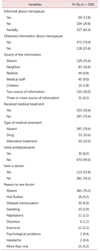
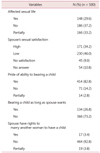
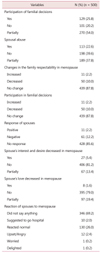


 XML Download
XML Download